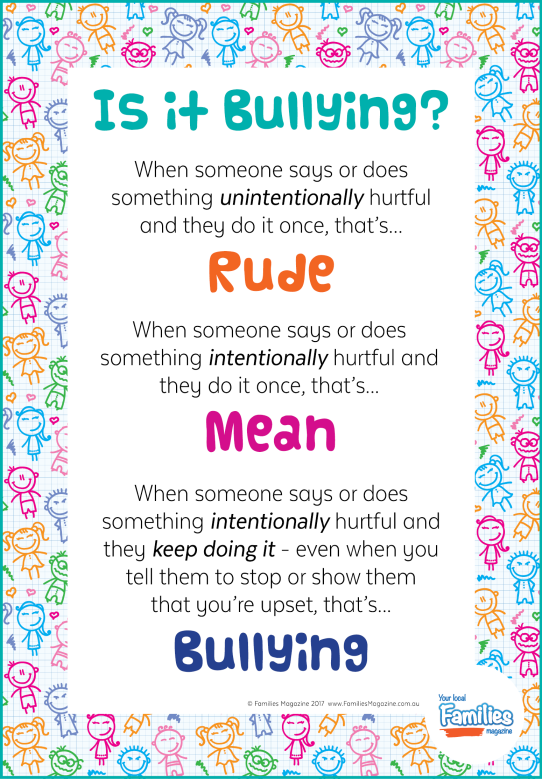Each classroom at Darra State School, displays the ‘Is it bullying?’ poster which is referred to when these situations arise. This resource is invaluable when having these conversations with students at school and/or at home.
Each definition provide a learning opportunity in identifying exactly what bullying is and if it is indeed taking place.
Often bullying is reported but once fully investigated, it is very rare that the incident is actually bullying.

The following extract has been taken from https://kidshelpline.com.au/teens/issues/bullying.
They provide brilliant resources and guidance on how to deal with this topic and a clear description of what bullying is and what it is not. These conversations at home are just as important as they are at school.
What is bullying?
- Sometimes, people get confused about what is and isn’t bullying.
- People can think that someone saying something they don’t like is bullying – but it’s not. Bullying is different from conflict or unkindness.
- Bullying is mean, but being mean doesn't always mean bullying.
Bullying behaviours:
- Are aggressive, unkind or mean behaviours
- Are repeated behaviours (it must happen multiple times, in an ongoing way to be defined as bullying)
- Happen on purpose
- Must have a power imbalance – which means that people bullying and the people being bullied aren’t seen as being ‘equal’, e.g. older, bigger people picking on smaller, younger people, or ‘popular’ people targeting someone who they see as being ‘unpopular’, or who is struggling to make friends.
Bullying is not the same as
- Being rude – saying or doing something hurtful that wasn’t planned or meant to hurt someone, e.g. someone pushing in front of you in the canteen line
- Being mean – doing something hurtful to someone on purpose once or twice, e.g. a friend refusing to play with you one day
- Conflict – having a disagreement with a friend, e.g. two friends getting into an argument and saying mean things to each other
- Respectful feedback on behaviours you're doing that aren’t ok, e.g. “It’s not ok roll your eyes every time they talk about sport.”
- A friend putting in a ‘boundary’ e.g. “I don't like it when you keep telling me what to do.”
- Natural consequences in socialising, e.g. a friend not trusting you because you shared their secret